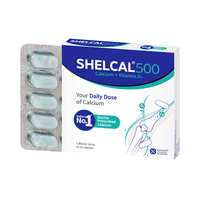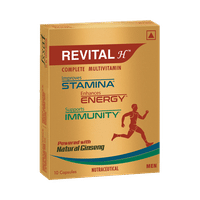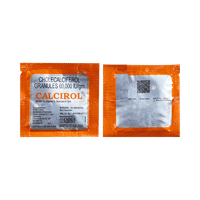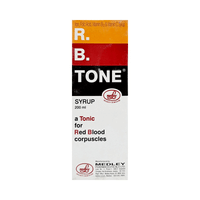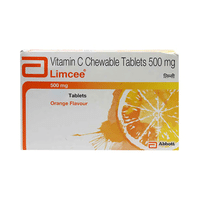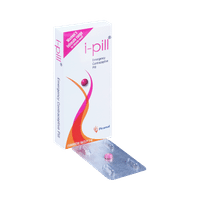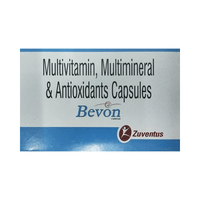Rs.365.60for 1 strip(s) (10 soft gelatin capsules each)
food interaction for Biocod-MX
alcohol interaction for Biocod-MX
pregnancy interaction for Biocod-MX
lactation interaction for Biocod-MX
food
alcohol
pregnancy
lactation
Biocod-MX Softgel Capsule may be taken with or without food.
None
None
CAUTION
It is not known whether it is safe to consume alcohol with Biocod-MX Softgel Capsule. Please consult your doctor.
CONSULT YOUR DOCTOR
Information regarding the use of Biocod-MX Softgel Capsule during pregnancy is not available. Please consult your doctor.
CONSULT YOUR DOCTOR
Information regarding the use of Biocod-MX Softgel Capsule during breastfeeding is not available. Please consult your doctor.
CONSULT YOUR DOCTOR
SALT INFORMATION FOR Biocod-MX
Calcitriol(0.25mcg)
Uses
Calcitriol is used in the treatment of post menopausal osteoporosis and calcium deficiency.
How it works
Calcitriol is the active form of Vitamin D. It raises Vitamin D levels in your blood. This in turn raises calcium levels in your blood by helping you absorb more calcium from your intestine.
Common side effects
Headache, Nausea, Abdominal pain, Vomiting, Weight loss, Increased calcium level in blood, Rash, Urinary tract infection, Itching, Erythema (skin redness), Decreased appetite, Increased creatinine level in blood, Dry skin, Worsening of psoriasis, Hypersensitivity, Feeling thirsty, Dehydration, Calcinosis cutis, Fever, Skin swelling, Contact dermatitis
Eicosapentaenoic Acid(180mg)
Uses
Eicosapentaenoic Acid is used for nutritional deficiencies.
How it works
The omega-3 fatty acids eicosapentaenoic acid is long-chain n-3 polyunsaturated fatty acids, which compete with arachidonic acid for inclusion in cyclo-oxygenase and lipoxygenase pathways. It's actions include hypolipidaemic action (especially a reduction in plasma triglycerides) by reducing very-low-density lipoproteins; anti-inflammatory action, attributed to effects on leukotriene synthesis; and antiplatelet effect, attributed to effects on prostanoid synthesis, which promote vasodilatation, reduction in platelet aggregation, increased bleeding time and decreased platelet counts.
Common side effects
Nausea, Gastrointestinal discomfort, Burping, Vomiting, Constipation, Diarrhea
Docosahexanoic acid(DHA)(120mg)
Uses
Docosahexanoic acid(DHA) is used for nutritional deficiencies.
How it works
Docosahexaenoic acid (DHA) belongs to the class of medications called as nutritional supplements. DHA plays a vital role in the brain development. DHA decreases cholesterol and triglyceride levels, inhibits platelet aggregation and oxidation of LDL, decreases the synthesis of inflammatory markers such as prostaglandins. Overall, DHA plays a vital role in reducing the heart and circulatory disease risks.
Common side effects
Allergy, Heartburn, Weight gain, Nausea, Diarrhea
Methylcobalamin(1500mcg)
Uses
Methylcobalamin is used in vitamin B12 deficiency.
How it works
Methylcobalamin is a form of vitamin B12 that restores its level in the body thereby helping in treating certain anemias and nerve problems.
Common side effects
Decreased appetite, Diarrhea, Nausea, Rash
Coral calcium(225mg)
Uses
Coral calcium is used in the treatment of calcium deficiency.
Common side effects
Vitamin K2-7(45mcg)
Uses
Common side effects
Vitamin B6 (Pyridoxine)(2mg)
Uses
Vitamin B6 (Pyridoxine) is used in the treatment of nutritional deficiencies.
How it works
Vitamin B6 (Pyridoxine) provides essential nutrients.
Common side effects
Burning sensation, Tightness sensation, Headache, Nausea, Sleepiness, Upset stomach, Paresthesia (tingling or pricking sensation)
Folic Acid(400mcg)
Uses
Folic Acid is used in the treatment of anemia due to chronic kidney disease, iron deficiency anemia and anemia due to folic acid deficiency.
How it works
Folic Acid is a form of vitamin B. It plays a vital role in the formation of red blood cells, which carry oxygen throughout the body. It is also essential in pregnancy due to its role in the development of the unborn baby's brain and spinal cord.
Common side effects
No common side effects seen
L-Methyl Folate(800mcg)
Uses
L-Methyl Folate is used in the treatment of nutritional deficiencies.
How it works
L-Methyl Folate provides essential nutrients.
Common side effects
Gastrointestinal discomfort, Bitter taste, Confusion, Taste change, Excitement, Hyperactivity, Impaired concentration, Impaired judgment, Irritation, Loss of appetite, Sleep disorder, Flatulence, Nausea
Zinc Sulphate Monohydrate(4mg)
Uses
Zinc Sulphate Monohydrate is used in the treatment of nutritional deficiencies.
How it works
Zinc Sulphate Monohydrate provides essential nutrients
Common side effects
Abdominal pain, Indigestion, Nausea, Vomiting, Diarrhea, Gastric irritation, Stomach inflammation
SUBSTITUTES FOR Biocod-MX
No substitutes foundExpert advice FOR Biocod-MX
- Do not take any other forms of Vitamin D unless your doctor suggests.
- Take calcium supplements along with Vitamin D3 as suggested by your doctor.
- Drink plenty of fluids (such as water) as it is important not to become dehydrated.
- Avoid using antacids without your doctor's advice. Some antacids can make it harder for your body to absorb calcitriol.
- Consult your doctor if you notice a metallic taste in mouth, muscle or joint pain, headache or drowziness.
Frequently asked questions FOR Biocod-MX
Calcitriol
Q. What is Calcitriol? What is it used for?
Calcitriol is the active form of Vitamin D. It increases the levels of Vitamin D in your blood which helps to increase calcium levels in the blood by increasing the absorption rate of calcium from your intestine. Thus, it is used in the treatment of calcium deficiency and postmenopausal osteoporosis.
Q. Is Calcitriol effective?
Calcitriol is effective if used in the dose and duration advised by your doctor. Do not stop taking it even if you see improvement in your condition. If you stop using Calcitriol too early, the symptoms may return or worsen.
Q. How should Calcitriol be taken?
Calcitriol should be taken in the dose and duration advised by your doctor. It can be taken with or without food. However, it would be best to take it at the same time each day to avoid the chances of missing a dose.
Eicosapentaenoic Acid
Docosahexanoic acid(DHA)
Methylcobalamin
Q. What is Methylcobalamin?
Methylcobalamin contains vitamin B12. Vitamin B12 is an essential nutrient which is required by the body to make red blood cells and maintain a healthy nervous system. It is also important for releasing energy from food and using vitamin B11 (folic acid).
Q. Why can’t I get sufficient vitamin B12 from my diet?
You can get vitamin B12 from sources like meat, fish, eggs and dairy products. While people who are vegetarian or vegan may not get Vitamin B12 as it is not found naturally in foods such as fruits, vegetables and grains. Therefore, deficiency of Vitamin B12 is usually noticed in vegetarians or vegans.
Q. What happens if I have vitamin B12 deficiency?
Deficiency of vitamin B12 may cause tiredness, weakness, constipation, loss of appetite, weight loss and megaloblastic anemia (a condition when red blood cells become larger in size than normal). It may also lead to nerve problems such as numbness and tingling in the hands and feet. Other symptoms of vitamin B12 deficiency may include problems with balance, depression, confusion, dementia, poor memory and soreness of the mouth or tongue.
Coral calcium
Vitamin K2-7
Vitamin B6 (Pyridoxine)
Folic Acid
Q. Is it ok to take Folic Acid when not pregnant?
Usually, folic acid requirements are met from the diet and therefore additional supplements are not required. In general, Folic Acid is recommended only when you have a deficiency of folic acid. However, Folic Acid is advised to women who are pregnant and who want to conceive. The medicine should be taken at least 4 weeks before pregnancy and should continue its use up to 3 months of pregnancy. Consult your doctor if not sure.
Q. Can Folic Acid cause weight gain?
Animal studies on Folic Acid suggest that taking the medicine in excess along with a high-fat diet may lead to weight gain and fat accumulation. But this weight gain was not evident when taken along with a normal or low-fat diet, even with excess Folic Acid. In humans, similar studies have not been conducted and therefore knowledge regarding weight gain is lacking. Therefore, if you are on Folic Acid eat a low-fat meal to be on the safer side.
Q. How long does Folic Acid take to work?
Folic Acid usually starts working within a few hours of taking it. If you are taking it for iron deficiency anemia, you may start feeling better after a few weeks of taking it. In case you are taking it during pregnancy, you may not notice any difference but this does not mean that the dose is not working. Continue taking Folic Acid for the duration recommended by your doctor.
L-Methyl Folate
Q. What is L-Methyl Folate? What is it used for?
L-Methyl Folate contains folate which is also known as folic acid (a form of Vitamin B). This medicine is used to treat or prevent deficiency of folate in the body. Folate plays an essential role in the production of red blood cells, and its deficiency can lead to anemia.
Q. Who should not take L-Methyl Folate?
You should not use this medication if you have ever had an allergic reaction to L-Methyl Folate or any of its ingredients. Before you take this medication, tell your doctor if you have a vitamin B12 deficiency, pernicious anemia or a history of bipolar disorder (manic depression). Also, inform your doctor if you are pregnant or breastfeeding. Let your doctor know about all the other medicines you are taking because they may affect, or be affected by, this medicine.
Q. Is L-Methyl Folate effective?
L-Methyl Folate is effective if used in the dose and duration advised by your doctor. Do not stop taking it even if you see improvement in your condition. If you stop using L-Methyl Folate too early, the symptoms may return or worsen.













